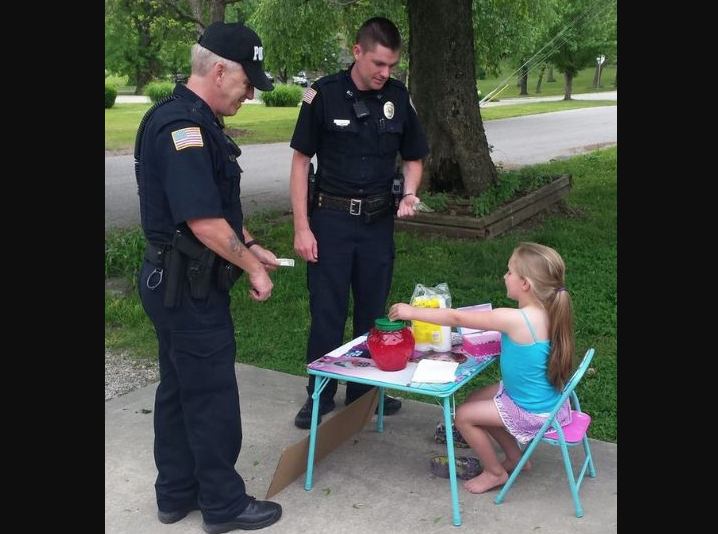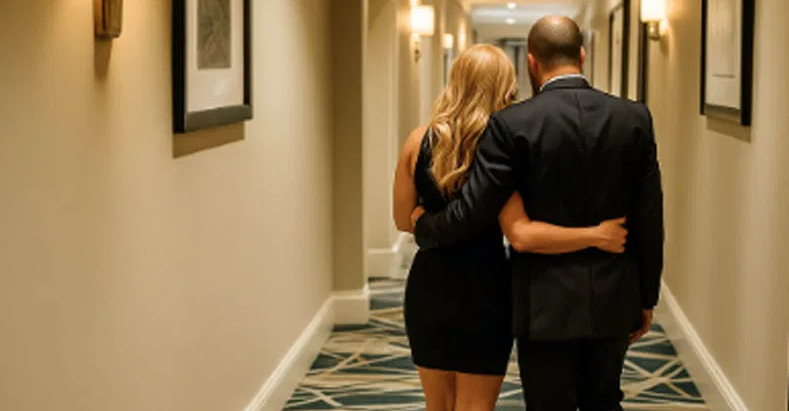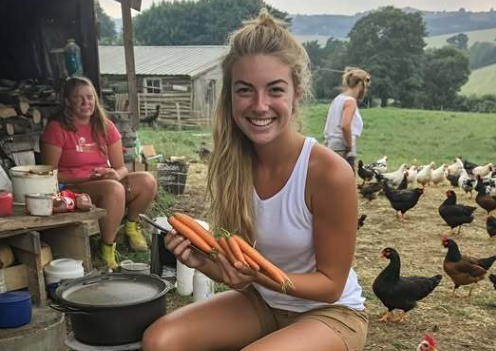My daughter Mackenzie set up her first lemonade stand last Saturday. She had the entire operation planned out on a piece of notebook paper: sign designs, pricing (“25¢ per cup”), and a “discount for neighbors who wave.” She sat out there with a bowl of change, a red plastic jar, and a big Frozen-themed table she had pulled from her room. An hour in, she hadn’t had a single customer, but she stayed put—barefoot, hopeful, practicing her “Hi there!” every time a car drove past.
Then a police cruiser rolled by slowly. I could see her stiffen. They continued on, but a minute later, they circled back and pulled up directly in front of her. I nearly rushed out the door, thinking perhaps someone had complained or something unusual was occurring.
One officer stepped out and crouched near the stand, smiling kindly. Mackenzie’s small voice trembled as she inquired if they desired lemonade.
The officer chuckled. “Actually, young lady, we received a report. Someone stated an ‘unlicensed business operating on the sidewalk.’ That wouldn’t be you, would it?” She blinked. “Uhh… I have lemonade. It’s only 25 cents. But waving is free.”
I stood frozen in the doorway, uncertain whether to intervene or allow the situation to unfold. The second officer leaned out the window and gave me a thumbs up, a gesture of reassurance. I exhaled, feeling half-relieved, half-worried.
The crouching officer looked at Mackenzie’s hand-drawn sign and smiled. “You know, we enforce lemonade laws very seriously in this town. Very serious matters.”
Mackenzie’s eyes widened. “Am I in trouble?” The officer scratched his chin, deep in thought. “Hmm. We might need to conduct a taste test. For… inspection purposes, you understand.” She nodded, her tiny hands shaky as she poured from the plastic jug into a paper cup.
He sipped it, then made an elaborate show of smacking his lips. “Well, well. That’s some of the best lemonade I’ve had all week.” She grinned as if the sun had appeared solely for her.
Then, before they left, the officer dropped a five-dollar bill into her red jar. “This payment is to cover any future permits you might require.”
The other officer leaned out again. “We’ll be back. A refill might be necessary.” Mackenzie waved as they drove off, her heart practically pounding with pride. I walked out to her and sat beside her on the grass. She looked up at me, eyes wide.
“Mom… I thought I was going to jail.” I laughed, pulled her into a hug, and told her how proud I was.
However, despite the charm of the encounter, something continued to bother me that evening. When I posted a picture of her little stand on our neighborhood Facebook group, I included the story about the police visit. My intention was to convey humor and share their kindness. Yet, I was unprepared for the subsequent reactions. The comments began to pour in.
“Wait, they actually responded to a complaint?” “I hope they weren’t serious about the licensing thing.” “This happened to my nephew in another town—they made him shut down!” I dismissed these concerns. It was probably an isolated incident. Perhaps someone called without realizing it was a child. Still, the more I read, the more apparent it became how frequently individuals reported children for simply… being children.
Two days later, I received a letter in the mail from the Homeowners’ Association.
I rolled my eyes before even opening it. It was a “reminder” concerning the use of community sidewalks for “non-commercial purposes only unless permitted.” My blood boiled.
I was not angry at the officers—they had clearly been gentle and compassionate—but I was furious that someone in our neighborhood considered it necessary to report a seven-year-old operating a lemonade stand with a cardboard sign and dollar-store lemonade mix. That night, I discussed it with Mackenzie. “Someone did not appreciate your lemonade stand,” I said gently. “They believed it was not allowed.” She frowned. “But I didn’t do anything wrong.” “You didn’t,” I said, stroking her hair. “Some individuals simply forget what it’s like to be young.” She remained quiet for a moment. “Can I still sell lemonade?” I hesitated. A part of me wanted to say no, to shield her, to avoid potential difficulties. But another part—a stronger inclination—desired to impart a more profound lesson. “Only if you let me be your assistant,” I said with a wink.
So the next weekend, Mackenzie resumed her stand. This time, she was equipped with signs laminated in plastic sleeves, a fold-up umbrella for shade, and a new slogan: “Mackenzie’s Legal Lemonade – Powered by Mom.” A steady stream of neighbors stopped by; most purchased a cup, while others offered smiles and thumbs-up. Even the mailman requested a cup.
Around noon, an unexpected event occurred. An older man, whom we had never seen before, parked his car near the curb and slowly approached. He was tall, perhaps in his seventies, wearing a worn baseball cap and moving with a heavy step. “Is this the famous lemonade stand I saw on Facebook?” he inquired. Mackenzie beamed. “Yes, sir! Would you like one cup or two?” He chuckled. “One will do.” After sipping, he sat down on the edge of our driveway. “You know, when I was your age, I operated a Kool-Aid stand on my grandma’s porch. A nickel a cup. I did not earn much, but I recall it as vividly as if it were yesterday.” They conversed for fifteen minutes—predominantly he spoke. He spoke of his grandmother, summer days in the 1950s, and the satisfaction derived from earning even a few cents.
Then he uttered words that surprised both of us. “Individuals like you remind people like me that certain things still hold value. That it is acceptable to pause and be kind.” Before departing, he tucked a ten-dollar bill into her jar. “Continue your endeavors, sweetheart.” After that day, circumstances shifted.
Mackenzie’s stand became a regular weekend fixture. Cars would halt. Neighbors brought their children. One family even brought homemade cookies to exchange for lemonade. Someone printed a banner that proclaimed: “Support Local—Even If They’re Under 10!” and hung it on their fence.
But the most significant development transpired two weeks later. The very HOA president who had dispatched the warning letter—Mrs. Barnes—stopped by. She stood rigidly, hands clasped, lips pursed. I braced myself.
However, she then looked down at Mackenzie and stated, “I… would like a cup of lemonade, please.” Mackenzie’s face brightened. “Of course! Do you prefer it sweet or sour?” Mrs. Barnes hesitated. “Let’s try sweet.” As she accepted the cup, I noticed a subtle smile appear at the corner of her mouth. “I suppose a little entrepreneurship never caused harm,” she muttered.
That Sunday, Mackenzie earned $48.12. We donated half to the local animal shelter, an idea she conceived while sketching puppy faces on her signs. The shelter sent her a thank-you note and featured her photograph on their page. That’s when the local news picked up the story.
A week later, a news van parked on our street. They interviewed her in front of her stand. She wore a sunhat and appeared serious when questioned about her “business model.” “I simply desired to bring smiles to people,” she stated. “And perhaps assist puppies.” The clip gained widespread attention. We received messages from individuals across the state. A man offered to sponsor her stand. A woman in another town stated her daughter had established her own stand because of Mackenzie.
Then came the true revelation. The police department disseminated the story on their social media, commending her as “The Sweetest Business Owner in Town.” They even showcased a photograph of the officer from that initial day, holding a lemonade cup and offering a thumbs-up.
However, my favorite comment originated from a woman I did not know. She wrote, I was the one who placed the call. I apologize. She revealed she had been experiencing a difficult week, overwhelmed and irritable. Upon seeing the stand, she assumed it involved reckless teenagers. Only later did she view the photograph online and comprehend it was a small girl simply striving to accomplish something pleasant.
She added, I drove by last Saturday. I observed her smiling. I did not stop, but I will next time. Thank you for the reminder. We all require it. This brought tears to my eyes.
The truth is, Mackenzie did not embark on a mission to transform anyone. She simply wished to sell lemonade. Yet, she reminded our neighborhood of something small yet vital—kindness is contagious. And at times, it takes only a red jar, a cardboard sign, and a child’s unwavering optimism to recall the essence of decency.
Reflecting on it, I am grateful for that initial phone call. Not because it was justified, but because it led to a more positive outcome. It fostered connection among us. It softened rigid attitudes. It granted an older man a cherished memory, a stern woman a smile, and a young girl the conviction that she possessed the ability to effect change.
So, what is the lesson conveyed here? Perhaps rules hold importance, but compassion holds greater significance. Perhaps kindness should never require official permission. Or perhaps, if you possess something pleasant to offer the world—even if it is merely lemonade—you should not permit apprehension to deter you. You never know who might require that small measure of hope.




